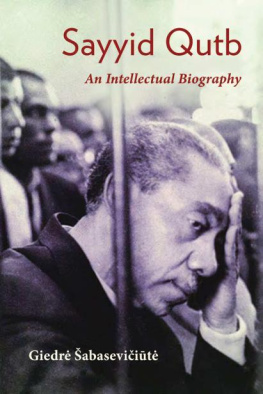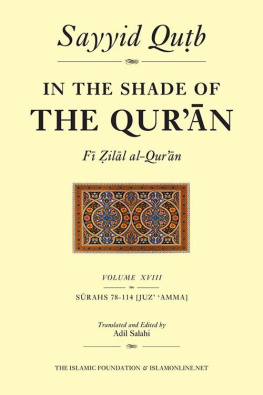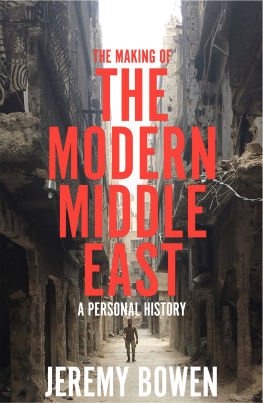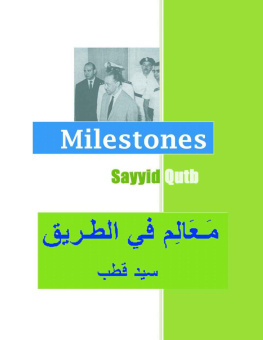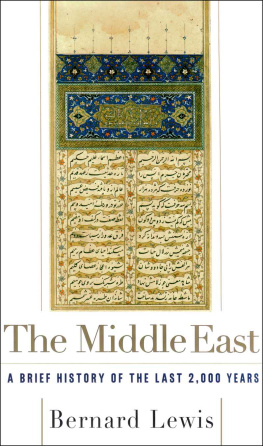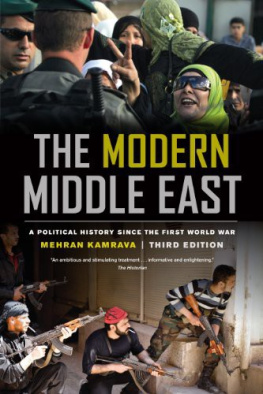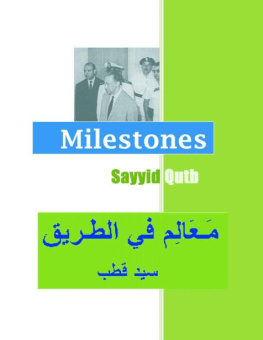Sayyid Qutb
Modern Intellectual and Political History of the Middle East
Fred H. Lawson, Series Editor
Select Titles in Modern Intellectual and Political History of the Middle East
The Autocratic Parliament: Power and Legitimacy in Egypt, 18662011
Irene Weipert-Fenner
Hakibbutz Haartzi, Mapam, and the Demise of the Israeli Labor Movement
Tal Elmaliach
Irans Experiment with Parliamentary Governance: The Second Majles, 19091911
Mangol Bayat
National Symbols in Modern Iran: Identity, Ethnicity, and Collective Memory
Menahem Merhavy
Ottoman Rule of Law and the Modern Political Trial: The Yldz Case
Avi Rubin
Shaykh Ysuf al-Qaraw: Spiritual Mentor of Wasa Salafism
Sagi Polka
Watermelon Democracy: Egypts Turbulent Transition
Joshua Stacher
Why Alliances Fail: Islamist and Leftist Coalitions in North Africa
Matt Buehler
For a full list of titles in this series, visit https://press.syr.edu/supressbook-series/modern-intellectual-and-political-history-of-the-middle-east/.
Sayyid Qutb
An Intellectual Biography
Giedr abaseviit
Syracuse University Press
Copyright 2021 by Syracuse University Press
Syracuse, New York 13244-5290
All Rights Reserved
First Edition 2021
21 22 23 24 25 266 5 4 3 2 1
The paper used in this publication meets the minimum requirements of the American National Standard for Information SciencesPermanence of Paper for Printed Library Materials, ANSI Z39.48-1992.
For a listing of books published and distributed by Syracuse University Press, visit https://press.syr.edu.
ISBN: 978-0-8156-3742-4 (hardcover)
978-0-8156-3728-8 (paperback)
978-0-8156-5529-9 (e-book)
Library of Congress Cataloging-in-Publication Data
Names: Sabaseviciute, Giedre, author.
Title: Sayyid Qutb : an intellectual biography / Giedre Sabaseviciute.
Description: First. | Syracuse : Syracuse University Press, 2021. | Series: Modern intellectual and political history of the Middle East | Includes bibliographical references and index. | Summary: Standing at the crossroads of biography and intellectual history, this book seeks to trace the debates on literature between writers, Muslim scholars, and Islamists in Egypt between 1900 and 1960. To understand these debates, it follows the intellectual career of Egyptian writer and late-life Islamist, Sayyid Qutb Provided by publisher.
Identifiers: LCCN 2021007880 (print) | LCCN 2021007881 (ebook) | ISBN 9780815637424 (hardback) | ISBN 9780815637288 (paperback) | ISBN 9780815655299 (ebook)
Subjects: LCSH: Qutb, Sayyid, 19061966. | Muslim scholarsEgyptBiography. | Authors, ArabEgyptBiography. | Islam20th century.
Classification: LCC BP80.Q86 S23 2021 (print) | LCC BP80.Q86 (ebook) | DDC 320.55/7092 [B]dc23
LC record available at https://lccn.loc.gov/2021007880
LC ebook record available at https://lccn.loc.gov/2021007881
Manufactured in the United States of America
To My Parents
Contents
Illustrations
Acknowledgments
The research for this book started ten years ago as a project for a masters thesis in cole des hautes tudes en sciences sociales in Paris. During the time it took to develop into a PhD dissertation, and then into a book, this research traveled through the different intellectual inquiries, scholarly practices, academic cultures, and languages of the countries in which I lived. This book is a patchwork of these, the most prominent of which are the French school of sociology, Anglo-American scholarship in intellectual history, and the Egyptian tradition of literary writing. In many regards, this book is the result of a strenuous effort to reconcile these different intellectual cultures, each with its specific inquiries, methodologies, and notions of truth.
One of the theses of this book is that ideas come into being through mutual interactions with the surrounding community. I need to mention and thank those who helped me to develop mine. First of all, I wish to thank Hamit Bozarslan, who agreed to supervise my masters thesis and PhD dissertation at a time when I hardly spoke French or knew anything about sociology. He was the first one to draw my attention to the parallels of thought between Sayyid Qutb and Marxist intellectuals, and the importance of the postWorld War II anticolonial activism in understanding Qutbs life. My four years of fieldwork in Egypt were funded by a two-year doctoral scholarship accorded to me by the CEDEJ in Cairo. Secondly, my writing of this book was made possible by a five-year postdoctoral fellowship at the Oriental Institute of the Czech Academy of Sciences in Prague. I was lucky to have Ondej Bernek and Jan Zouplna as, respectively, the director of the institute and the Middle Eastern department, who provided all the necessary support for the writing of this book and were patient during its multiple rewritings. My colleagues at the Oriental Institute followed the daily trials of the writing process. I would like to thank especially Nobuko Toyosawa for sharing her experience of writing and publishing, Kevin Schwartz for brainstorming suitable book titles, and Stefano Taglia for putting me in touch with the publisher. This book benefited from conversions with a number of people who all cannot be mentioned here. A special credit goes to Aymon Kreil, Shaaban Yusuf, Lucie Ryzova, Samuli Schielke, Raphael Cormack, Bettina Grf, Ifdal Elsaket, Angela Giordani, Yoav Di-Capua, Naima Bouras, Gatan du Roi, Walter Armbrust, Marie Vannetzel, Clment Steuer, Anwar Mugith, Hussam Aql, and all my interlocutors who agreed to share their memories of Sayyid Qutb, the majority of whom are not among us anymore. I would like to thank the staff of the Egyptian National Library and the Dominican Institute for Oriental Studies (IDEO) in Cairo, for whom I certainly became a familiar face during the long years of my research. Some of my colleagues and friends have read and commented on draft chapters of this book. My special thanks is addressed to Ebru Akcasu for suggesting improvements of the first chapter, and especially to Muhammad Addakhakhny, who read the entire manuscript hours before its final submission, verified the translation, and challenged me on some of its conclusions. All the translations in this book have been revised and polished with his generous help. I am particularly grateful to Youssef Faltas, who was the first audience for all the ideas of this book and patiently discussed them with me. This book would not have come into fruition without his long-term intellectual companionship and constant encouragement.
Sayyid Qutb
Introduction
The Return of the Ghost
In May 1954 the Egyptian intellectual Sayyid Qutb published a short essay on literature in the inaugural issue of the Majallat al-Ikhwan al-Muslimin. Laconically titled The Method of Literature, the essay aimed to open a field of production and criticism of specifically Islamist literature (al-adab al-islm).
Reduced to a single essay, Qutbs engagements with literature after joining the Muslim Brotherhood in 1953 might appear insignificant for Egypts intellectual history. However, this essay was indeed significant for a substantial proportion of Egyptian intellectuals. Its publication in 1954 launched an intensive debate in the pages of the Majallat al-Ikhwan al-Muslimin, where writers grappled for three months with the meaning of

